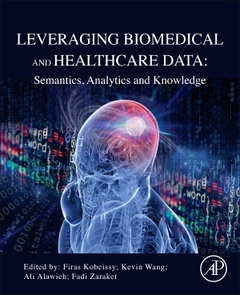Leveraging Biomedical and Healthcare Data Semantics, Analytics and Knowledge
Coordonnateurs : Kobeissy Firas, Wang Kevin, Zaraket Fadi A., Alawieh Ali

Leveraging Biomedical and Healthcare Data: Semantics, Analytics and Knowledge provides an overview of the approaches used in semantic systems biology, introduces novel areas of its application, and describes step-wise protocols for transforming heterogeneous data into useful knowledge that can influence healthcare and biomedical research. Given the astronomical increase in the number of published reports, papers, and datasets over the last few decades, the ability to curate this data has become a new field of biomedical and healthcare research. This book discusses big data text-based mining to better understand the molecular architecture of diseases and to guide health care decision.
It will be a valuable resource for bioinformaticians and members of several areas of the biomedical field who are interested in understanding more about how to process and apply great amounts of data to improve their research.
Part I Understanding Molecular Architecture of Disease Using Big Data1. Curation of molecular data pertaining to human cancer and the Cancer Genome Atlas Initiative 2. Merging data from published literature to understand the sequence of disease pathology 3. Predicting potential therapeutic targets using drug-gene and gene-disease associations 4. Combination of graph theory and big data analysis in genomics and proteomics 5. Challenges in sharing, standardization and dissemination of molecular big data
Part II Guiding Health Care Decisions Using Big Data6. Towards a unified version of EMR corpora and data systems7. Natural language processing and computational linguistics in EMR analysis8. Orienting infectious disease management using Big Data9. Modeling disease burden using big data10. Automated diagnosis and risk factor prediction based on natural language processing
Part III Online Repositories and In-Silico Research in the Era of Big Data11. Curating a brain connectome using Big Data12. Genotype and phenotype associations using online clinical repositories – a step-wise approach13. In-silico pharmacology and cost- and time- effective approaches in drug discovery14. Guided and semi-automatic approaches for clinical meta-analyses15. Towards a unified language in molecular big data
bioinformaticians; graduate students in systems biology; members of biomedical field interested in data mining and data integration technologies.
Dr. Kobeissy is the author of more than 75 articles, reviews and book chapters along with two patents. He is a member of the Center of Neuroproteomics and Biomarker Research (CNBR) at the McKnight Brain Institute at the University of Florida. He is the editor of three books (Humana Press and Taylor and Francis); the books deal with biomarker identification and proteomics research. Dr. Kobeissy has published extensively in the areas of systems biology pertaining to the areas of deciphering biomarker and pathways of pathogenesis in brain studies obtained from high throughput proteomics data.
Dr. Kevin Wang is internationally recognized for his original contributions to the fields of traumatic brain injury (TBI)-linked proteolytic enzymes, therapeutic targets, neuroproteomics/systems biology, biomarker discovery and validation. Dr. Wang has published in the areas of systems biology/bioinformatics of biomarkers identification in with the main application on neural injury. In his quest for brain injury therapeutics, his omics/systems biology work has led to the identification of clinical diagnostic utility for two brain injury protein biomarkers during the acute phase of brain injury which have now been confirmed tested in clinical samples and are now moving forward to FDA-approval seeking pivotal clinical study. His current research directions include studying mechanisms for CNS injury, neuroproteomics, systems biology, and substance abuse-induced brain perturbation using systems biology approach. He has published more than 200 peer-reviewed papers, reviews and book chapters and co-authored eigh
- Includes at each section resource pages containing a list of available curated raw and processed data that can be used by researchers in the field
- Provides demonstrative and relevant examples that serve as a general tutorial
- Presents a list of algorithm names and computational tools available for basic and clinical researchers
Date de parution : 11-2018
Ouvrage de 225 p.
19x23.3 cm



